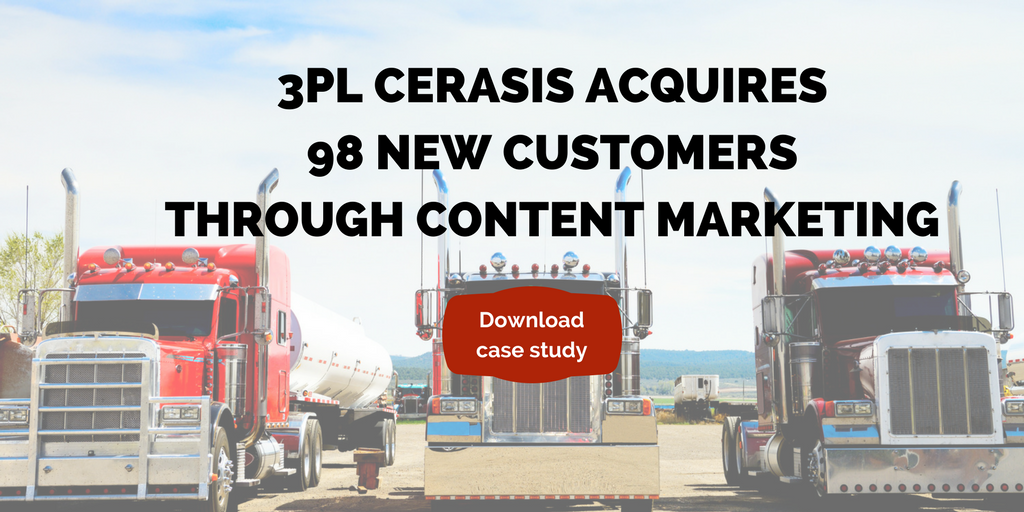
Why Inbound Marketing is a Better Strategy Than Outbound for Supply Chain
The supply chain is increasingly seeing the value of moving to an inbound marketing strategy. Here’s what’s at the core of the change to inbound marketing.
Traditional marketing in the supply chain uses an outbound strategy. We’ve all done it. Taking out ads in trade publications. Sending direct mailings. Cold calling.
These types of approaches fight to get your brand name in front of prospective customers, hoping to get a marketing message that resonates in front of the right person at the right time.
Inbound marketing is different
Inbound marketing is different. It’s, well, confident. It showcases your industry merit rather than trying to convince people of it.
With inbound marketing, you publish relevant, informative content where your audience already is – your website, related social media, and other online industry channels – to add value at every stage of their buyer’s journey.
Prospective customers come to associate your brand with industry expertise. When they are ready to buy, they think of you. That’s an inbound content marketing strategy.
Why the supply chain is shifting to inbound content marketing
The supply chain is increasing seeing the value of moving to an inbound marketing strategy. What’s at the core of the change to inbound marketing?
On a theoretical level, it’s recognizing that your business has more to offer than its primary product or service. This is so very important. You also have a team of extremely knowledgeable industry experts with unique and informed perspectives.
But switching to an inbound content marketing strategy is also about recognizing that your customers want much more from you than just your product. The business to busienss (BtB) buying climate is growing longer and more complex, and customers today are demanding value outside the sales funnel. Traditional outbound marketing accomplishes neither of these.
[bctt tweet=”Switching to an inbound content marketing strategy is about recognizing that your customers want more from you than just your product. Customers today are demanding value outside the sales funnel. ” username=”Fronetics”]
Why inbound marketing is better for the supply chain
If that didn’t convince you, put simply, inbound content marketing is just more effective for four main reasons:
- Cost. Inbound marketing is typically less expensive than outbound. Hubspot reports that each sales lead costs approximately 61% less for organizations that employ an inbound strategy versus those that focus on outbound marketing.
- Measurability. Measuring your success with inbound marketing is considerably easier. For example, you’ll never know how many people saw your billboard, but you can measure exactly how many people read your blog post.
- Longevity. Digital content is often evergreen – meaning it’s forever relevant – and older posts that need an update can be easily optimized. Essentially, content lives forever and continues drive traffic long after you publish it. In fact, at Fronetics, about 80% of our traffic comes from posts that are 6 months old or older.
- Targetability. With inbound marketing, you only expend resources on prospects that are already looking for information about your industry, products, and services, making inbound marketing a much more targeted approach for your lead-nurturing efforts. Less expensive, easier to measure, lasts longer, and represents a more targeted approach? Seems like a no-brainer. But what’s the catch? Well, executing a good inbound content marketing isn’t easy, and it generally takes at least six months to yield results.
Executing a good inbound content marketing strategy
Done well, inbound content marketing is extremely effective. A good content marketing strategy is about understanding the questions and concerns that are particular to your customer base and about offering quality information and analysis that answers those needs.
The role of content in the supply chain and logistics industries is to grow brand awareness and customer engagement, increase lead generation and nurturing, and establish your company as an industry thought leader in the minds of your prospective customers.
An inbound marketing strategy helps you become more than just another business to customers. You can become a valuable resource for everything related to your products, services, and industry as a whole. Which is precisely what your potential customers are currently expecting from your supply chain and logistics business.
This post originally appeared on EBN Online.
Related posts:

